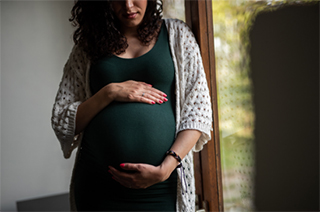June 29, 2023

Exposure to per- and polyfluoroalkyl substances (PFAS) may reduce fertility in women by as much as 40%, researchers from the NIEHS-funded Environmental Health Sciences Core Center at Mount Sinai found. The team reported that higher levels of PFAS in blood were associated with a significant reduction in the likelihood of pregnancy and live birth among a group of reproductive-age women in Singapore who were trying to conceive.
“PFAS can disrupt our reproductive hormones and have been linked with delayed puberty onset and increased risks for endometriosis and polycystic ovary syndrome in previous studies. What our study adds is that PFAS may also decrease fertility in women who are generally healthy and are naturally trying to conceive,” said senior author and Mount Sinani Core Center member Damaskini Valvi, M.D., Ph.D.


